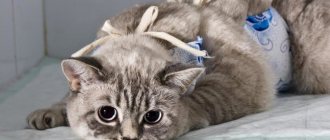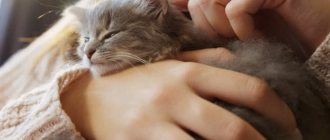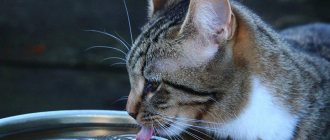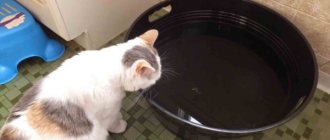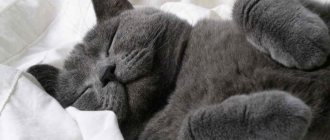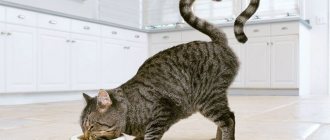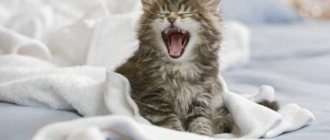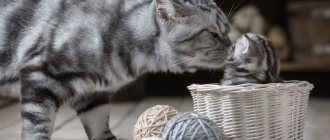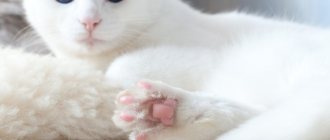Problems with the mucous membrane
This condition is sometimes caused by small particles of food or objects that get stuck in the throat or esophagus. If the particles have sharp edges, then there is a high probability of injury to the mucous membranes, which causes pain and severe discomfort. Naturally, in this state the cat is unlikely to dream about food.
In addition, a foreign body in the stomach or intestines causes difficulty in moving food. Food stagnates and is not digested, and begins to rot. Putrefactive bacteria can lead to acute poisoning, so your pet should be seen by a veterinarian as soon as possible.
Trying to remove the stuck pieces on your own will aggravate the pain and, most likely, will not bring results. The only way to alleviate the condition before the doctor arrives is to drink plenty of cold water.
Anorexia
Catastrophic weight loss in the body can be caused by problems with digestion or the presence of worms in the body. This is especially common in kittens.
The baby's body is still developing, so it is natural that some food is not fully absorbed, creating discomfort in the intestines. For this reason, the baby may refuse food.
What to do? Give neutral food, boiled or well-heated, restorative broths and always fresh water.
If worms have settled in the esophagus, they poison the kitten’s blood with the products of their vital activity. This causes general malaise and weakness, and as a result, loss of appetite and lethargy.
Mandatory measures are to give an anthelmintic in exact accordance with the weight and age of the kitten (for example, Drontal, Milbemax tablets, Profender, Stronghold drops). Next, observe your pet’s urine and stool. Insertion of parasites is easy to distinguish in the urine, and the helminths themselves can be found in the stool. Even if there are no worms in the intestines, precautions will not be unnecessary.
Gastrointestinal diseases
Problems with the gastrointestinal tract in cats are determined by the following signs:
- vomit;
- diarrhea;
- discharge containing mucus;
- bloating;
- hard and tense stomach;
- strong odor from the mouth.
Among the most common problems is gastritis or the accumulation of hair in the stomach.
It’s not difficult to deal with a hairball: drinking plenty of fluids and special medications that help remove hair from the stomach will solve this problem (for example, “Phytomins”).
But gastritis is somewhat more complicated; its treatment requires time and effort. At the initial stage, it is necessary to give the cat boiled water and rice water. Then they use activated carbon diluted in water and medications prescribed by the doctor (most often these are stomach drops, Almagel). Food should be low-fat and exclusively unsalted.
When a cat's condition should cause alarm
The owner of the animal should be wary of prolonged fasting. For kittens the critical period is one day, for older pets - 2; cats for three days. An alarming sign is refusal to drink, a drop in temperature below normal, and excessive salivation.
Be sure to read:
Discharge from the eyes in cats: normal or pathological, causes, what to do, treatment and prevention
In such situations, emergency veterinary care is required.
Liver diseases
Liver problems are difficult to diagnose visually. This is indicated by indirect signs:
- frequent diarrhea;
- change in color of mucous membranes to all shades of yellow;
- yellowing of the skin;
- brownish urine and gray stool;
- conjunctivitis.
The first sign of liver malfunction is jaundice. It is clearly visible to the naked eye - part the hairs on the cat’s body and evaluate the color of the skin. In its normal state it ranges from white to light pink. If yellowing or pronounced yellow spots are noticeable, then rush to the veterinarian.
The diagnosis is made after blood and urine testing. The doctor will prescribe treatment and determine a diet for each specific case.
Liver dysfunction
This organ is of great importance for the coordinated functioning of the entire body. Its functions are stimulation of digestion, participation in metabolic processes, protection of the immune system, neutralization of toxins, production of important enzymes and much more. Fasting leads to failures.
Diagnosing liver problems is difficult and will require a lengthy examination. If your pet does not eat and only drinks water, there is reason to suspect something is wrong: liver dysfunction is always accompanied by severe thirst.
Other symptoms may include:
- yellowness of the mucous membranes as the first sign of a problem;
- change in the color of waste products (feces become discolored, urine darkens);
- frequent diarrhea and vomiting;
- skin problems arise - itching, dry skin, dandruff;
- the animal becomes apathetic.
If the situation is advanced, the diseased liver increases in size. This can be determined by palpation of the peritoneum.
Dangerous tick bite
Meeting with a tick is especially dangerous for cats that have access to free walks on the street. Parasites waiting in the grass can attach themselves to the cat’s body while relaxing in the fresh air.
If you notice that your pet categorically refuses to eat for several days, this may mean that the tick is drinking juices and is the cause of her weakness.
Inspect high-risk areas - tender abdomen, armpits, areas behind the ears. These are the warmest and most defenseless places where ticks often cling. If you find a swollen parasite, try to consult a doctor who will provide qualified assistance.
It is advisable to analyze the removed tick for health risks. After this, the doctor will prescribe the necessary treatment.
Lethargic cat, kitten. The cat is lethargic
Cats are not particularly active. They spend most of their time lying in their favorite place. But the rest of the time they are quite active, love to play, run around the apartment or house. A loving owner should be alarmed if his cat is lethargic and sleeping.
almost all the time.
Reasons why a cat, cat or kitten is lethargic
With many diseases, the cat is lethargic and does not eat.
, drinks only water. If this condition lasts more than a day, then this is a reason to consult a doctor.
When infected with worms, the cat is lethargic
, but eats normally, and loses weight quickly. In severe cases, appetite may disappear, problems with stool may appear, and vomiting may occur.
If the cat has become lethargic
In warm weather, before walking outside, you should check it for ticks, fleas and other parasites. Before a walk, put a collar on your pet or treat it with products against skin parasites.
Poisoning is a sign due to which the cat is lethargic, does not eat, does not drink
. A furry pet can be poisoned by chemicals, plants, raw meat, or rodents. If he has a fever, a dry nose and rapid breathing, he should immediately consult a doctor.
- A cat may be lethargic
due to intestinal obstruction. In this case, constipation occurs and the stomach becomes tight. You cannot solve this problem without the help of a specialist. - Lethargy in a cat
accompanied by coughing, hoarseness, and difficulty breathing may be a sign of asthma or another lung disease. An examination is necessary, followed by treatment with antibiotics. - Another disease due to which the cat is lethargic, does not eat, does not drink
is called urolithiasis. It affects cats and sterilized cats very often. The cause may be infection, hypothermia, or the formation of stones. - If the cat has become lethargic
and is limping, it may have suffered a dislocation or fracture. For diagnosis it is necessary to take an x-ray.
What to do if the cat is lethargic (the cat is lethargic)?!
If the cat is lethargic
less than a day, then most likely treatment is not necessary. He may be depressed, the pet may be offended by his owners if he is not played with, a change in weather or taking medication may affect this. But if there are any other symptoms of disease, you need to contact your veterinarian. Only a competent specialist can determine the cause and prescribe treatment.
Source: https://vetklinik-msk.ru/bolezni-koshek/simptomy-zabolevanij-u-koshek/754-vyalyj-kot-koshka-vyalaya
Diseases of the circulatory system
Blood diseases are more common in older cats. A diagnosis can only be made based on laboratory blood tests. To do this, they study the composition of red blood cells and the level of hemoglobin. The cause of the disease may be disturbances in the functioning of the hematopoietic organs.
During the treatment, general strengthening and supportive medications (Radostin, Sanal Senior Lecithin), as well as foods high in iron, are prescribed. It is necessary to provide care and note changes in the condition of the sick cat.
Diabetes
Cats, like people, have elevated blood sugar levels. This does not occur too often, but such a disease requires increased attention and timely treatment.
Reasons: monotonous, poor nutrition and lack of exercise. Diabetes most often affects animals whose activity is limited to the walls of a city apartment. You should watch neutered cats especially carefully - their pancreas function is often impaired due to excess weight.
Treatment of diabetes is a very complex and painstaking process, so not all owners are ready for it. Some prefer not to torture the animal, but to euthanize it.
If the diagnosis is confirmed by a specialist, then long-term treatment begins. It includes insulin injections and a special diet. You constantly need to measure your sugar level (about once every 2-3 hours). So the doctor prescribes an individual dosage and course of therapy.
If the measures prescribed by the doctor are followed, the cat can fully recover and live a long, fulfilling life.
The cat is lethargic and sleeps a lot, or the cat is weak
If the cat is lethargic for several days and you do not see any improvement, you should not ignore the situation and should contact a veterinarian or call a veterinarian to your home to identify the disease in the cat in the early stages.
The main diseases of cats and the causes of weakness and lethargy: anemia (low level of red blood cells), blood diseases, diseases of the cardiovascular system, lung diseases, chronic inflammation or infection, lethargy associated with taking medications, metabolic disorders, gastrointestinal diseases, diseases urinary tract, cancer, diseases of the immune system, skin, neurological, nutritional disorders, behavioral disorders, diseases of the skeletal system, infections, poisoning, trauma.
The cat has pale gums
A cat's pale gums or other mucous membranes indicate blood loss or shock. Possible cat illnesses and causes of blood loss or shock are life-threatening. A veterinary examination is highly recommended.
The cat has a temperature, fever
Fever is high body temperature. Doctors believe that high temperature is a way to fight infectious diseases in cats.
A separate part of the brain is responsible for the increase in temperature, which raises or lowers body temperature in response to the presence of disease in the cat’s body (viruses or infections). Normal temperature in cats is 38-39.5 °C.
If your cat, cat or kitten has a fever, call a veterinarian at home.
The cat is having seizures. What to do?
Seizure or convulsions are a disease in cats that are associated with a brain disorder. Convulsions in a cat can be either in the form of twitching on the face, or when the cat falls on its side, grinds its teeth, urinates under itself, and the muscles of the front and hind legs involuntarily contract. Convulsions in a cat can last a few seconds, several minutes or hours.
Seizures are considered a neurological disorder, i.e. Cramps themselves are a symptom, not a disease.
The causes of illness in cats may be related to metabolic disorders, the presence of toxins or tumors in the body, low sugar levels, liver diseases, inflammation or infections of the nervous system, head injuries, and diseases of the circulatory system.
The cat has red eyes
- Red eyes in a cat, cat, or kitten are not a specific symptom of an inflammatory process or infection in the body. The symptom of red eye is observed with several different diseases that can be in different parts of the eye.
- For example, the following diseases of cats: inflammation or infection can be in the eyelid area, third eyelid, mucous membrane of the eye, cornea, sclera (white membrane of the eye). Inflammation of the eye can also be inside the eye itself (for example: glaucoma (high pressure inside the eye)) or the eye socket. Also, a cat’s eyes can be both red or separately.
- It all depends on the illness of the cat. Red eyes can either be a sign of a serious illness or require minimal veterinary intervention.
Cough. Cat, cat coughing
Coughing in a cat is very rare.
It is believed that a cat's cough is a protective reflex that helps clear the throat, larynx, and airways of mucus or other foreign bodies, and protects the lungs from aspiration (the penetration of foreign bodies into the airways as a result of their absorption by the flow of inhaled air). Coughing makes it difficult for the animal to breathe.
Causes of cough and possible cat diseases: airway obstruction, bronchitis, pneumonia, heart disease, lung cancer, heart disease. All of the above causes and diseases of cats are dangerous to the life of the animal. If your cat has a cough, he needs to be examined by a veterinarian.
Source: https://vetdoctor.kiev.ua/bolezni-koshek-i-kotov-16-ostrih-simptomov-u-koshek-3/
The oral cavity is injured
A cat can get injured during a fight; eating in this case causes severe pain and is of no benefit.
Also, the causes may be toothaches, stomatitis, various types of ulcers and cuts.
Treatment of the oral cavity at home should only be carried out with the prescription of a veterinarian. It is not allowed to cauterize damaged areas with iodine, brilliant green, or alcohol. It is also not worth applying any creams to the affected areas - this can spread the infection into the blood.
Consult your doctor and provide all possible assistance to your beloved cat.
Lethargic, sleepy cat. Lack of appetite
The cat is one year old. Suddenly become lethargic, not eating anything, constantly sleeping? Short
Hello! Unfortunately, there is very little information about your cat, so it is difficult to make even a presumptive diagnosis.
But if the animal becomes lethargic, sleepy, refuses water and food, then this is a reason to immediately contact a veterinarian! There, through a clinical examination, the doctor will be able to determine the reason for this behavior of the cat and, accordingly, make the correct diagnosis.
Other situations
Problems with the reproductive system
Animals have great difficulty undergoing the rehabilitation period after castration or sterilization. More often than not, they simply hide in a distant dark corner and lick their wounds there. There is no need to disturb them in this state.
All that is required is to place the litter tray close and provide fresh drinking water.
The same rules can be applied to the period of the first heat in a young cat.
Stress
In the lives of our tailed friends, there are also difficult days, and even prolonged depression.
It can be provoked by:
- moving;
- parting with a beloved owner;
- separation of kittens from their mother (in this case it will be difficult for both the kittens and the cat itself).
If you notice that your cat is sad all the time, shows no energy and mostly sleeps, then you need to let her come to her senses. For a day or two, she may well arrange a fasting day for herself.
If food intake does not begin on both the third and fourth days, you should be concerned about the animal’s condition and start feeding it, at least through force.
Vomiting in a cat - poisoning and more
In addition to the first version that comes to mind, that the cat was poisoned, there are a number of other reasons for the malaise.
The most important thing to note is severe overeating. If an animal has been hungry for a long time and then eats a lot, the stomach does not have time to cope with the load. Excess food is eliminated naturally.
Animals can independently regulate vomiting processes, relieving themselves of the feeling of heaviness and discomfort in the abdomen.
If the food was eaten too quickly, it is possible that the walls of the esophagus were strongly irritated by something, which also led to vomiting.
Be sure to monitor your pet's diet. Feeding foods that are difficult and take a long time to digest creates additional problems with the gastrointestinal tract. If you feed your cat dry food, it may be worth switching to a different one.
Recommendations for improving the condition:
- Analyze what the animal has eaten recently. Perhaps the condition was affected by a new product or food that had not been introduced into food before.
- For constipation combined with vomiting, give an enema. Toxins accumulated in the body will be eliminated faster.
- Cats with long, thick hair require thorough brushing every day. It is very likely that the cause is wool stuck in the stomach.
What does it mean for a pet to refuse food and drink?
There are times when a cat does not eat for several days, and at first glance it is difficult to say what is causing this. When a kitten has no appetite , it is often said that he has anorexia. Moreover, unlike hunger, which manifests itself due to the physiological characteristics of the body, anorexia is associated with psychological factors.
This condition can be provoked by many reasons, due to which the cat may lose its appetite for a long time. In a kitten, it can be observed when certain disorders occur in its body that contribute to the development of the disease. If the kitten does not show its former activity , does not eat or drink for several days and does not leave its place, then it can be assumed that it has problems with the stomach or other important organs. It's hard to imagine that a cat that experiences unpleasant pain every minute will think about food.
Another reason that may be associated with a cat's lethargic behavior is the first heat.
The owner may mistake this condition for a disease . For the animal, this is the first experience when it feels natural urges, so it may behave confused. Usually the kitten behaves this way only for a few days, but then it becomes cheerful and active again.
If for two or three days you observe how the kitten does not want to eat, but only sleeps, then some kind of illness has probably come down on it. Lack of appetite is often associated with the development of infectious diseases, for example, the appearance of worms. To prevent such situations, it is advisable to periodically give him special drugs against helminths for preventive purposes.
Among the entire list of diseases, we can highlight the most common ones in domestic cats. Keep in mind that if your pet does not eat for several days , remains lethargic, and is losing weight , then you can be sure that it is some kind of illness. And first of all, you need to find out what infection caused this condition and what needs to be done.
A kitten may begin to lose weight during diseases of the gastrointestinal tract.
Characteristic symptoms of this disease are diarrhea and other unconventional discharge.
But to be sure that this is the disease, you should show it to a veterinarian, who can make a more accurate diagnosis. Liver disease is also common in cats. Any change in the cat's behavior is a signal for the owner to take him to the veterinarian to be sure that nothing threatens him. To prevent this from happening again , you must be more attentive to what you feed the kitten. His diet must contain foods that can cleanse this organ.
- Diseases of the pancreas. Some animals may lack appetite precisely because of the development of this disease.
- Diseases of the reproductive system.
- Blood diseases.
- Along with the above reasons, a kitten may refuse water and food due to diseases of the mucous system - throat, nose, mouth, etc.
Other reasons
If a cat does not eat for a long time, this should not be immediately perceived as a sign of an incipient disease. It is possible that weight loss may be due to the following reasons:
- The kitten did not like the new food;
- When changing your place of residence. It often happens that cats do not immediately get used to a new place. To speed up the adaptation period, you can use special medications that help animals when moving.
- Stress arising from various reasons.
Be that as it may, if your cat has no appetite during the day, you should not panic and wonder what to do. If your pet's condition does not change over a longer period of time, then you should take him to the veterinarian . But here too there are some peculiarities. In order not to worry ahead of time about the health of the kitten, it will be useful for you to familiarize yourself with the following information:
- If you have a young and healthy cat, he can go without eating and still feel quite well for 5 days. If after this time his appetite returns, he will be able to quickly replenish the need for all the necessary vitamins and carbohydrates and will again become cheerful and active.
- If you have an older cat living in your apartment who has lost his appetite, keep in mind that he can go without food for no more than 3 days. If the matter is limited to this, and after this period his appetite awakens, then he will be able to quickly recover. But he will be able to return to his usual lifestyle only if this was not caused by a diet.
- If a similar situation happens to a small kitten who refuses to eat all day long, know that this is dangerous for his health and can result in death. The kitten does not have a sufficient supply of substances to survive without food for more than a day. Therefore, if you notice that your pet refuses breakfast, then you should immediately take action.
- Owners who keep cats with chronic diseases need to be especially attentive to their pets. Prolonged fasting is extremely contraindicated for them. And no matter what time the disease appears, you must do everything possible to ensure that the kitten does not go hungry for more than 2 days.
How can you help if the cat doesn’t eat or drink anything, but only sleeps?
In a situation where the animal does not eat anything, but at least drinks, it is easier to understand. This is how the tailed animals regulate their well-being themselves, and their appetite returns over time.
What to do if you also refuse water? What to do if the cat sleeps all the time and does not react to the presence of the owner? This is a very dangerous condition, especially if the cat is very young or, conversely, old.
A small kitten does not yet have enough strength to cope with all illnesses, and in the body of an old cat, the protective resources are already depleted.
Therefore, if you are completely apathetic and refuse to eat or drink, immediately contact your veterinarian. If after two days the cat does not at least start drinking, feel free to consult a doctor. Qualified help can save the life and maintain the health of your pet!
Eating problems
Sometimes owners do not pay much attention to what they feed their pet. If the diet is too monotonous, the question may later arise of what to do if the cat loses its appetite. Obviously, the animal may get tired of the same food over time, so the cat will be extremely reluctant to eat it. Then it is enough to introduce new components - feed or familiar homemade food.
© shutterstock
Another problem is insufficiently high-quality products, for example, sausages, pates of dubious composition, cheap food from little-known manufacturers, etc. It is important to pay attention to the composition and, if necessary, consult a veterinarian. It is possible that even some normal foods are contraindicated for your cat due to the characteristics of the digestive system.
